|
|
|
Sort Order |
|
|
|
Items / Page
|
|
|
|
|
|
|
| Srl | Item |
| 1 |
ID:
185096


|
|
|
|
|
| Summary/Abstract |
Using India as a theory building case, this paper puts forward a theoretical framework for understanding countries’ responses to global rules and implementation effects across diverse global governance regimes and contexts. The initial premise for this paper is that the strategic structure of implementation dilemmas faced by states and actors within countries need to be understood in addition to design dilemmas. Successful global regimes must not only solve cooperation and uncertainty problems at the initial stages in choosing the right institutional matrix, but also ‘require changes in domestic institutions.’ The need to change domestic institutions creates certain implementation dilemmas. These dilemmas are a joint product of the institutional design, specific policy issue and the domestic logic of responses after international agreements have been signed. This broader idea helps understand a wide variety of India’s interactions across global governance institutions. I also suggest a novel empirical strategy of cross-institutional analysis to assess implementation dilemmas. While we have numerous cross-national studies of how compliance occurs in a wide variety of countries, we lack theory-driven, empirically grounded, comparative studies of a single country or a group of countries across diverse global regimes. Such a framework can help us better understand how countries interact with a variety of global institutions and the reciprocal effects. This framework is then used to understand India’s interactions with diverse global regimes in an illustrative manner in this article, and in greater detail by other authors in the section published in this issue of Contemporary South Asia.
|
|
|
|
|
|
|
|
|
|
|
|
|
|
|
|
| 2 |
ID:
185557
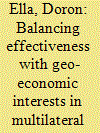

|
|
|
|
|
| Summary/Abstract |
Since its inception in December of 2015, scholars and policy-makers have been debating the motivations behind the design of the AIIB. This paper advances this debate by exploring whether and how the AIIB’s structure follow the design pattern of other leading MDBs, and how well did it manage to integrate institutional effectiveness considerations with promoting its largest shareholders’ geo-economic interests. It does so by comparing the design of the AIIB with that of the ADB and the World Bank, while integrating several approaches to institutional design. I argue that the AIIB’s architects identified certain functional deficiencies in the performance of existing financial institutions and attempted to establish an alternative that will better address these deficiencies. To achieve that, they tried to balance between certain structural features that promote institutional performance with features that promote powerful creditors’ geo-economic interests, as well as invest in AIIB’s attractiveness vis-à-vis other financial institutions. This paper finds that in multilateral development banks power considerations tend to overshadow issues of institutional effectiveness, while sometimes these are successfully integrated. And, that powerful actors are able to politicize certain functional design features and reassign their purpose from solving cooperation problems to advancing geo-economic interests.
|
|
|
|
|
|
|
|
|
|
|
|
|
|
|
|
| 3 |
ID:
191904


|
|
|
|
|
| Summary/Abstract |
International organizations come in many shapes and sizes. Within this institutional gamut, the multipurpose multilateral intergovernmental organization (MMIGO) plays a central role. This institutional form is often traced to the creation of the League of Nations, but in fact the first MMIGO emerged in the Western Hemisphere at the close of the nineteenth century. Originally modeled on a single-issue European public international union, the Commercial Bureau of the American Republics evolved into the multipurpose, multilateral Pan American Union (PAU). Contrary to prominent explanations of institutional genesis, the PAU's design did not result from functional needs nor from the blueprints of a hegemonic power. Advancing a recent synthesis between historical and rational institutionalism, we argue that the first MMIGO arose through a process of compensatory layering: a mechanism whereby a sequence of bargains over control and scope leads to gradual but transformative institutional change. We expect compensatory layering to occur when an organization is focal, power asymmetries among members of that organization are large, and preferences over institutional design diverge. Our empirical and theoretical contributions demonstrate the value a more global international relations (IR) perspective can bring to the study of institutional design. international relations (IR) scholars have long noted that international organizations provide smaller states with voice opportunities; our account suggests those spaces may be of smaller states’ own making.
|
|
|
|
|
|
|
|
|
|
|
|
|
|
|
|
| 4 |
ID:
172129
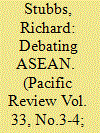

|
|
|
|
|
| Summary/Abstract |
The contributions of Alice D. Ba, Mark Beeson, and Anja Jetschke and Patrick Theiner to the discussion about how to understand and explain ASEAN as a regional organization raise significant issues. Most importantly, their ideas extend our ability as scholars and commentators to productively debate and evaluate the institutional developments and policies of ASEAN and, indeed, all regional organizations.
|
|
|
|
|
|
|
|
|
|
|
|
|
|
|
|
| 5 |
ID:
082135


|
|
|
|
|
| Publication |
2008.
|
| Summary/Abstract |
The issue of dispute settlement is problematic in the international system because it may conflict with sovereignty. States may find, however, that in order to facilitate cooperation, they should delegate some authority to resolve disputes to a third party. This article seeks to provide a measure for dispute settlement authority and some explanation for the delegation aspect of international cooperation by examining why states agree to grant dispute settlement authority to a particular kind of institutional arrangement, conventional international governmental organizations (IGOs). The analysis reveals that states tend to enter into IGO agreements with a higher degree of dispute settlement authority when members have a greater incentive to defect due either to the large number of other parties to the agreement, or due to greater cooperative demands as provided by the agreement
|
|
|
|
|
|
|
|
|
|
|
|
|
|
|
|
| 6 |
ID:
177618
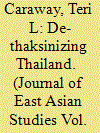

|
|
|
|
|
| Summary/Abstract |
Almost two decades after the initial victory of Thai Rak Thai, scholars still debate the forces behind Thaksin's rise to power. I revisit these debates and argue for a more explicit analysis of dynamics over time. I distinguish analytically between the founding moment of TRT's first victory and the subsequent reproduction of its dominance. I argue that TRT's financial muscle was a sufficient condition for its 2001 victory, that institutions merely contributed to the scale of its victory, and that its platform was not decisive. Once in power, however, institutions were instrumental in allowing TRT to complete its term, but more important for its long-term dominance was the rapid implementation of its campaign promises, which created a mass constituency that in turn made Thaksin-linked parties resilient at the polls despite institutional reforms designed to weaken their electoral performance.
|
|
|
|
|
|
|
|
|
|
|
|
|
|
|
|
| 7 |
ID:
146201


|
|
|
|
|
| Summary/Abstract |
This article examines the trade effect of flexibility design features within preferential trading arrangements (PTAs). Using a gravity model of bilateral trade that incorporates multilateral trade resistance, we report three main results. First, unconstrained escape provisions undermine the effectiveness of PTAs when it comes to increasing trade. Second, adding some restrictions to these escape provisions more than offsets the negative effect of unconstrained escape, leading to more effective PTAs than those without escape options. Third, adding more restrictions beyond a certain point serves only to make PTAs less effective. Thus, both too much institutional flexibility and too much institutional rigidity reduces the ability of PTAs to promote trade. However, fitting these results to the descriptive data makes it appear that most PTAs would be even more trade effective if they included greater restrictions on the use of their escape provisions. Consequently, it appears that policymakers generally choose fewer escape restrictions than would be optimal in terms of trade performance.
|
|
|
|
|
|
|
|
|
|
|
|
|
|
|
|
| 8 |
ID:
151314


|
|
|
|
|
| Summary/Abstract |
Contrary to other European Union (EU) restrictive measures, arms embargoes have preserved higher levels of member state sovereignty. They not only require members’ consensus to be imposed, but their implementation also is in the hands of member states. How has this affected the operation of EU arms embargoes? On the one hand, and according to the international institutions literature, both consensus and national implementation requirements can undermine the success of multilateral policies. On the other hand, the growth of EU arms export norms suggests that embargoes have become easier to impose and implement. But the relationship among EU arms export norms, institutional design and embargo operation remains under-examined in the literature. Drawing on case studies of the Russia and Uzbekistan embargoes—and on interviews with policymakers and experts—this article analyses this relationship. I argue that growing EU arms export norms have alleviated some, but not all, of the concerns associated with institutional design. Whether or not EU members cooperate on arms embargoes still seems to be determined by national-level considerations, rather than by joint foreign and security policy goals.
|
|
|
|
|
|
|
|
|
|
|
|
|
|
|
|
| 9 |
ID:
177680
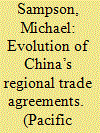

|
|
|
|
|
| Summary/Abstract |
There is a widespread consensus that China’s growing network of regional trade agreements in the Asia-Pacific has crucial strategic and economic implications for states in the region. Yet despite the recognition that China’s agreements are initially limited and then expanded substantially over time, few accounts explore the strategic and economic implications of this aspect of China’s approach. This article addresses this flaw by drawing attention to the relation between regional power dynamics and China’s gradualist approach to negotiating regional trade agreements. It presents a new framework which suggests that due to China’s steadily improving economic position vis-à-vis its regional counterparts and the growing economic dependence of these partners on it, China’s negotiating approach increases opportunities to maximize its growing bargaining leverage and influence over time and thereby improve its regional position still further. This article concludes by drawing out the implications of this for the region.
|
|
|
|
|
|
|
|
|
|
|
|
|
|
|
|
| 10 |
ID:
160247
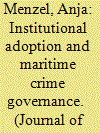

|
|
|
|
|
| Summary/Abstract |
The Djibouti Code of Conduct plays a central role in addressing maritime piracy and armed robbery in the Western Indian Ocean and the Gulf of Aden. Assuming rational actors base diplomatic decisions on cost–benefit calculations, this paper argues that decision-makers consider existing policy models on interstate cooperation when drafting international agreements. Comparing state-to-state agreements on the combat of maritime crimes which are located in different world regions, and studying the causal mechanisms behind policy adoption, the benefits of adopting institutional features from existing institutions, and exchanging best practices are underlined. The results suggest that the Djibouti Code of Conduct is subject to and subject of an inter-regional learning process. Facilitated by the International Maritime Organization, the code drew heavily on counter-piracy experiences from Southeast Asia, and in turn influenced cooperation on illicit maritime activities in West and Central Africa. Interviews with decision-makers add to the understanding of the code’s drafting and highlight the potential of inter-regional synergies for diplomacy in the Indian Ocean region beyond maritime crime governance.
|
|
|
|
|
|
|
|
|
|
|
|
|
|
|
|
| 11 |
ID:
096863
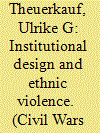

|
|
|
|
|
| Publication |
2010.
|
| Summary/Abstract |
Recent research on the motives of civil war has been dominated by the juxtaposition of greed versus grievance factors. This academic debate has generated a vast amount of empirical evidence to assess the explanatory power of the grievance concept but neglected its non-empirical limitations. In an attempt to direct attention back to the theoretical and methodological issues surrounding the grievance concept, the purpose of this analysis is twofold: first, I outline a grievance-based explanation of ethnic violence which argues that political institutions that provide low chances of political representation are likely to increase the odds of ethnic violence due to the intrinsic worth of political representation, its impact on the distribution of resources and powers, and its effects on perceptions of security. This explanation then serves, second, as a reference point to highlight three non-empirical limitations of the grievance concept, namely the lack of direct measures for grievances, the failure to identify clear reference categories of relative deprivation and the questionable assumption that all ethnic groups share common values. I conclude that due to these limitations, scholars working with the grievance concept inevitably remain in the realm of conjectures without being able to test the causal mechanisms they stipulate properly.
|
|
|
|
|
|
|
|
|
|
|
|
|
|
|
|
| 12 |
ID:
158850


|
|
|
|
|
| Summary/Abstract |
The question of international cooperation on nuclear security presents states with a conundrum. While states are wary of the potential for cheating and opportunism that would favor more legalized agreements, highly legalized agreements also create the risk of being constrained in an agreement with which others might not comply, leaving one state vulnerable. How do states balance these competing incentives? Through the study of all arms control agreements concluded, negotiated, and seriously considered since 1945, this analysis finds that at least some aspects of the legalization parameters that would make commitments more credible and sustainable through the future—in particular obligation and to a lesser extent delegation—also make bargaining over the terms of cooperation more difficult, sometimes delaying if not altogether subverting that process. These findings have implications not just for how theories of institutional design and cooperation apply to nuclear issues but also for policies related to the conduct of arms control negotiations.
|
|
|
|
|
|
|
|
|
|
|
|
|
|
|
|
| 13 |
ID:
152333
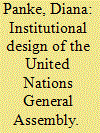

|
|
|
|
|
| Summary/Abstract |
Most international organizations are based on the principle of equality of states. Their institutional design grants all member states the same formal rights. Although formally equal, states differ immensely concerning their power capacities and size. Can institutional designs of international organizations mitigate real-world power- and size-related differences between member states, and if so, to which extent? To provide an answer, this article focuses on the United Nations General Assembly, which combines an equalizing institutional design with a large very heterogeneous membership. It shows that the strength of the equalizing effect varies across stages of the policy cycle. It is the weakest in the negotiation stage and the strongest in the final decision-making stage, while institutional design of international organizations has a de facto equalizing effect of medium strength in the agenda setting stage. Thus, while power and capacity differences matter, larger powerful states are not systematically better off throughout the entire policy cycle.
|
|
|
|
|
|
|
|
|
|
|
|
|
|
|
|
| 14 |
ID:
188827
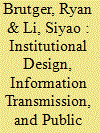

|
|
|
|
|
| Summary/Abstract |
Domestic debates about trade have increased the salience of international economic cooperation among the public, raising the question of whether, and how, domestic support can be rallied in support of international trade agreements. We argue that institutional features of trade agreements provide important cues to domestic audiences that shape support, particularly the membership composition and voting rules for multilateral deals. We use two survey experiments to show that the US public is more supportive of trade when it is negotiated with like-minded countries. We also find that the voting rules shape support for trade agreements, but differently across partisan audiences. Republican voters strongly favor the home country having veto power, whereas Democrats prefer agreements with equal voting rules. These differences are largely driven by perceptions of the agreement’s benefit for the nation and the public’s trust of the negotiators and perceived fairness of the rules.
|
|
|
|
|
|
|
|
|
|
|
|
|
|
|
|
| 15 |
ID:
131489
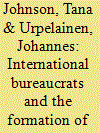

|
|
|
|
|
| Publication |
2014.
|
| Summary/Abstract |
Bureaucrats working in international intergovernmental organizations (IGOs) regularly help states design new IGOs. Sometimes international bureaucrats possess limited discretion in institutional design; sometimes, they enjoy broad discretion. In fact, they gain discretion even when they openly oppose state preferences. This contravenes conventional thinking about delegation: discretion should decrease as preference divergence between states and international bureaucrats increases. We develop a principal-agent theory of how much discretion states grant to international bureaucrats in the design of new IGOs. This is novel: while principal-agent theories of international delegation are common, scholars have not analyzed principal-agent relationships in the creation of new IGOs. We argue that even an international bureaucracy that disagrees with states' design preferences may enjoy substantial design leeway, because of states' need for bureaucratic expertise. In developing this argument, we employ a formal principal-agent model, case studies, and an original data set.
|
|
|
|
|
|
|
|
|
|
|
|
|
|
|
|
| 16 |
ID:
137268
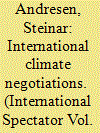

|
|
|
|
|
| Summary/Abstract |
Most observers agree that more than 20 years of UN climate negotiations have been a failure. Some argue that the top-down approach is one important reason for this and that a bottom-up approach or more exclusive club approaches would have rendered better results. Based on experience with these approaches so far this is far from self-evident and there are limits to what can be achieved by clever institutional design when deep-seated political conflicts prevail. Many approaches are also hybrids between the various approaches and the future climate regime will probably contain elements of both the top-down and the bottom-up approach. However no quick fixes can be expected for this exceedingly ‘malign’ problem.
|
|
|
|
|
|
|
|
|
|
|
|
|
|
|
|
| 17 |
ID:
158222
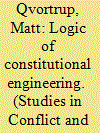

|
|
|
|
|
| Summary/Abstract |
Originally conceived by Aristotle and Thomas Hobbes, comparative constitutional engineering in its modern form is a relatively new field of political science. It is based on the premise that political behavior and policy outcomes can be affected and shaped by institutional design such as, above all, electoral systems. The article provides an overview of the empirical literature underlying this branch of institutional counterterrorism. The article presents the logic of constitutional engineering from its classical origins and especially through the work of Arend Lijphart. It is suggested that Lijphart provides a new paradigm in the sense employed by Thomas Kuhn. The article provides original research in support of this showing that the presence of consensus institutions has better explanatory value than most social factors.
|
|
|
|
|
|
|
|
|
|
|
|
|
|
|
|
| 18 |
ID:
176849
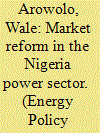

|
|
|
|
|
| Summary/Abstract |
The Nigeria Power sector reform was performed between the year 2010 and 2013 but it has undoubtedly been adjudged unsuccessful by most stakeholders. The failure of the reform is evidenced by a myriad of seemingly insurmountable economic, institutional, technical, financial and socio-political challenges exacerbated by the recent macroeconomic crisis. This paper performs a comparative analysis of the Nigeria reform with the “Standard model” of electricity reform to understand the root cause of the reform failures while taking cognizance of the starting conditions of Nigeria. Our result reveals that incomplete privatization coupled with the horizontal integration of the transmission and network operations, the underdeveloped gas supply infrastructure network and the ineffective/weak regulatory framework as the root problems. Thereafter, we recommended strengthening the regulatory framework as a good starting point to resolve sectoral problems. We argued that, considering the depth of the regulatory concerns, strengthening the framework will resolve the problems of investment, access and pricing and improve the overall sectoral performance (ex-post). Furthermore, we recommended the need for a workable market design and regulatory framework for decentralized solar PV generation and integration that is adaptable and nicely fits with a strengthened centralized generation framework.
|
|
|
|
|
|
|
|
|
|
|
|
|
|
|
|
| 19 |
ID:
163913
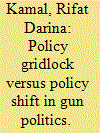

|
|
|
|
|
| Summary/Abstract |
Why do major events of gun violence (i.e., mass shootings) lead to incremental change or no federal legislative change at all in the United States while major events of gun violence have resulted in large-scale legislative changes in Canada? Exploring the complexities involved in this compelling question, this article conducts a comparative analysis of recent gun control policy gridlock and shift in these two countries. We concentrate on two mass shooting cases in each country: the Columbine (1990) and Sandy Hook (2012) massacres in the United States and the École Polytechnique Massacre (1989) and Concordia Shooting (1992) in Canada. We use veto player theory to gain insights into why tightening gun policy is so difficult to implement in the United States while Canada often follows up with policy transformations after a focusing event. This theory informs the central argument that the key factors underpinning the divergent policy outcomes on gun control issues in both countries involve differences in the structure of government/institutional design and the role and power of interest groups in each case.
|
|
|
|
|
|
|
|
|
|
|
|
|
|
|
|
| 20 |
ID:
115727


|
|
|
|
|
| Publication |
2012.
|
| Summary/Abstract |
Which components of power sharing contribute to the duration of peace and what explains the linkages between institutional design and stability? The authors argue that certain types of political power sharing are associated with more durable peace than others, primarily through their positive effects on governance and public service delivery. In particular, closed-list proportional representation (PR) electoral systems stand out among power-sharing arrangements, due to their ability to deliver superior governance outcomes which, in turn, can promote stability by undercutting the initial motivations for conflict or by reducing the feasibility of rebellion. The authors argue that these positive outcomes result from closed-list PR's ability to increase party discipline and checks on executive power, while reducing incentives for personalistic voting. The introduction of political institutions in postconflict negotiated settlements allows us to test the independent effects of institutions on governance and stability using survival analysis and a case study.
|
|
|
|
|
|
|
|
|
|
|
|
|
|
|
|
|
|
|
|
|